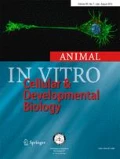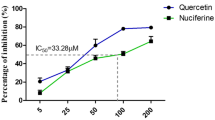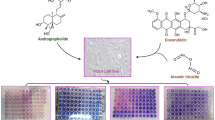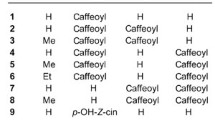Abstract
Cardiotoxicity is the major challenge in chemotherapy with doxorubicin (DOX) or adriamycin. Doxorubicin manifests oxidative stress via an uncontrolled progression of reactive oxygen species in cardiomyocytes; thereby, dysregulation and dysfunction of myocardium thus lead to apoptosis. Several attempts have been made to overcome this side effect in patients with antioxidant-rich supplements to control the free radicals. Plant-based or plant-derived compounds pay more attention to cure such complications in patients for supporting the treatment, revitalizing or regulating the normal metabolism. Hence, our study focused on pretreatment of embryonically derived rat cardiomyocytes (H9c2) with phytocompound lotusine to prevent DOX-mediated oxidative stress. From the experiment, the DOX-exposed cells have shown morphological abnormalities such as reduced cell size, shrinkage, blebbing, and chromatin condensation, whereas no such deformities were observed in lotusine-pretreated cells even after the exposure to DOX. Increased endogenous antioxidants with reduced lipid peroxidation were observed in lotusine-pretreated cells, whereas the antioxidants were reduced along with increased lipid peroxidation in doxorubicin-exposed cells. A decreased reactive oxygen species generation was evidenced with the 2′,7′-dichlorofluorescein diacetate (DCF-DA) staining method. In qPCR analysis, the lotusine-pretreated cells have mitigated doxorubicin-mediated apoptosis by downregulating the pro-apoptotic gene Bax and apoptotic executor caspase-3. It was further confirmed with the luminometric assay, which resulted in lesser luminescence in lotusine-pretreated cells, whereas higher luminescence was recorded in doxorubicin-alone-treated cells. In conclusion, the present study revealed that the lotusine pretreatment has exhibited potential cardioprotective activity against DOX-induced oxidative stress by increasing the intracellular antioxidant defense.








Similar content being viewed by others
References
Atale N, Gupta K, Rani V (2014) Protective effect of Syzygium cumini against pesticide-induced cardiotoxicity. Environ Sci Pollut Res 21:7956–7972. https://doi.org/10.1007/s11356-014-2684-3
Bradford MM (1976) A rapid and sensitive method for the quantitation of microgram quantities of protein utilizing the principle of protein-dye binding. Anal Biochem 72:248–254. https://doi.org/10.1016/0003-2697(76)90527-3
Branco AF, Pereira SL, Moreira AC, Holy J, Sardão VA, Oliveira PJ (2011) Isoproterenol cytotoxicity is dependent on the differentiation state of the cardiomyoblast H9c2 cell line. Cardiovasc Toxicol 11:191–203. https://doi.org/10.1007/s12012-011-9111-5
Chang C, Wu SL, Zhao XD, Zhao CT, Li YH (2014) Developmental toxicity of doxorubicin hydrochloride in embryo-larval stages of zebrafish. Biomed Mater Eng 24:909–916. https://doi.org/10.3233/BME-130885
Choi EH, Chang HJ, Cho JY, Chun HS (2007) Cytoprotective effect of anthocyanins against doxorubicin-induced toxicity in H9c2 cardiomyocytes in relation to their antioxidant activities. Food Chem Toxicol 45:1873–1881. https://doi.org/10.1016/j.fct.2007.04.003
Devkar RV, Pandya AV, Shah NH (2012) Protective role of Brassica olerecea and Eugenia jambolana extracts against H2O2 induced cytotoxicity in H9C2 cells. Food Funct 3:837–843. https://doi.org/10.1039/c2fo00001f
Djeridane A, Yousfi M, Nadjemi B, Boutassouna D, Stocker P, Vidal N (2006) Antioxidant activity of some Algerian medicinal plants extracts containing phenolic compounds. Food Chem 97:654–660. https://doi.org/10.1016/j.foodchem.2005.04.028
Dobbenga-Rhodes YA, Prive AM (2006) Assessment and evaluation of the woman with cardiac disease during pregnancy. J Perinat Neonatal Nurs 20:295–302
Du Y, Guo H, Lou H (2007) Grape seed polyphenols protect cardiac cells from apoptosis via induction of endogenous antioxidant enzymes. J Agric Food Chem 55:1695–1701. https://doi.org/10.1021/jf063071b
El-Seedi HR, Zahra MH, Goransson U, Verpoorte R (2007) Cyclopeptide alkaloids. Phytochem Rev 6:143–165. https://doi.org/10.1007/s11101-006-9029-x
Furukawa H, Yang T-H, Lin TJ (1965) On the alkaloids of Nelumbo nucifera Gaertn. XI. Alkaloids of loti embryo. 4. Structure of lotusine, a new water-soluble quaternary base. Yakugaku Zasshi J Pharm Soc Japan 85:472. https://doi.org/10.1248/yakushi1947.85.5_472
Goodman J, Hochstein P (1977) Generation of free radicals and lipid peroxidation by redox cycling of adriamycin and daunomycin. Biochem Biophys Res Commun 77:797–803. https://doi.org/10.1016/S0006-291X(77)80048-X
Harishkumar R, Manjari MS, Rose C, Selvaraj CI (2019a) Protective effect of Nelumbo nucifera (Gaertn.) against H2O2-induced oxidative stress on H9c2 cardiomyocytes. Mol Biol Rep. Springer Science and Business Media LLC 47(2):1117–1128. https://doi.org/10.1007/s11033-019-05208-5
Harishkumar R, Reddy LPK, Karadkar SH, Murad MA, Karthik SS, Manigandan S, Selvaraj CI, Christopher JSG (2019b) Toxicity and selective biochemical assessment of quercetin, gallic acid, and curcumin in zebrafish. Biol Pharm Bull 42:1969–1976. https://doi.org/10.1248/bpb.b19-00296
Hosseinzadeh L, Behravan J, Mosaffa F, Bahrami G, Bahrami A, Karimi G (2011) Curcumin potentiates doxorubicin-induced apoptosis in H9c2 cardiac muscle cells through generation of reactive oxygen species. Food Chem Toxicol 49:1102–1109. https://doi.org/10.1016/j.fct.2011.01.021
Ilavenil S, Kim DH, Jeong Y II et al (2015) Trigonelline protects the cardiocyte from hydrogen peroxide induced apoptosis in H9c2 cells. Asian Pac J Trop Med 8:263–268. https://doi.org/10.1016/S1995-7645(14)60328-X
Jaradat NA (2005) Medical plants utilized in Palestinian folk medicine for treatment of diabetes mellitus and cardiac diseases. J Al-Aqsa Univ 9:1–28
Jialing W, Zhifang Z, Qiong C, Jin Y, Xiouling F (1999) Effects of lotusine on contractions of blood vessels and platelet cyclic nucleotides. Pharmacol Clin Chin Mater Med 4
Kalyanaraman B, Joseph J, Kalivendi S, Wang S, Konorev E, Kotamraju S (2002) Doxorubicin-induced apoptosis: Implications in cardiotoxicity. Oxygen/Nitrogen Radic: Cell Injury Dis. Springer US; 119–24. https://doi.org/10.1007/978-1-4615-1087-1_13
Ke C, Gupta R, Xavier D, Prabhakaran D, Mathur P, Kalkonde YV, Kolpak P, Suraweera W, Jha P, Allarakha S, Basavarajappa D, Dhimar V, Jaiswal H, Kalaska S, Memon G, Nair S, Rao V, Rasaily R, Sahu D, Sharma S, Shukla DK, Singh JK, Singh L, Sinha A, Awasthi S, Banthia JK, Dikshit R, Kumar R, Thakur JS, Ram F, Ram U, Sheth J, D’Souza G, Begum R, Xavier D, Gupta R, Gelband H, Jha P, Ke C, Kolpak P, Suraweera W, Kalkonde YV, Mathur P, Prabhakaran D (2018) Divergent trends in ischaemic heart disease and stroke mortality in India from 2000 to 2015: a nationally representative mortality study. Lancet Glob Heal 6:e914–e923. https://doi.org/10.1016/S2214-109X(18)30242-0
Li XX, He GR, Mu X, Xu B, Tian S, Yu X, Meng FR, Xuan ZH, du GH (2012) Protective effects of baicalein against rotenone-induced neurotoxicity in PC12 cells and isolated rat brain mitochondria. Eur J Pharmacol 674:227–233. https://doi.org/10.1016/j.ejphar.2011.09.181
Liu JY, Lee MJ, Chen HM, et al (2011) Ocimum gratissimum aqueous extract protects H9c2 myocardiac cells from H2O2-induced cell apoptosis through Akt signalling. Evidence-based Complement Altern Med. https://doi.org/10.1155/2011/578060
Liu Y, Asnani A, Zou L et al (2014) Visnagin protects against doxorubicin-induced cardiomyopathy through modulation of mitochondrial malate dehydrogenase. Sci Transl Med 6:266ra170
Mao CY, Bin LH, Kong N et al (2014) Levocarnitine protects H9c2 rat cardiomyocytes from H2O2-induced mitochondrial dysfunction and apoptosis. Int J Med Sci 11:1107–1115. https://doi.org/10.7150/ijms.9153
Niraula NP, Kim SH, Sohng JK, Kim ES (2010) Biotechnological doxorubicin production: pathway and regulation engineering of strains for enhanced production. Appl Microbiol Biotechnol 87:1187–1194. https://doi.org/10.1007/s00253-010-2675-3
Ohkawa H, Ohishi N, Yagi K (1979) Assay for lipid peroxides in animal tissues by thiobarbituric acid reaction. Anal Biochem 95:351–358. https://doi.org/10.1016/0003-2697(79)90738-3
Ott M, Gogvadze V, Orrenius S, Zhivotovsky B (2007) Mitochondria, oxidative stress and cell death. Apoptosis 12:913–922. https://doi.org/10.1007/s10495-007-0756-2
Rajput MA, Khan RA, Assad T (2017) Anti-epileptic activity of Nelumbo nucifera fruit. Metab Brain Dis 32:1883–1887. https://doi.org/10.1007/s11011-017-0064-7
Toné S, Sugimoto K, Tanda K, Suda T, Uehira K, Kanouchi H, Samejima K, Minatogawa Y, Earnshaw WC (2007) Three distinct stages of apoptotic nuclear condensation revealed by time-lapse imaging, biochemical and electron microscopy analysis of cell-free apoptosis. Exp Cell Res 313:3635–3644
van Duijn P, van Prooijen-Knegt AC, van der Ploeg M (1985) The involvement of nucleosomes in Giemsa staining of chromosomes. Histochemistry 82:363–376. https://doi.org/10.1007/BF00494066
Wang J, Zhao Z, Yao W, Jiang M (1986) Effects of lotusine on the action potentials in myocardium and slow inward current in cardiac purkinje fibers. Chin Pharmacol Bull 06
WHO. (2017) Cardiovascular disease. https://www.who.int/en/news-room/fact-sheets/detail/cardiovascular-diseases-(cvds). Accessed 17 May 2017
Yin Y, Guan Y, Duan J, Wei G, Zhu Y, Quan W, Guo C, Zhou D, Wang Y, Xi M, Wen A (2013) Cardioprotective effect of Danshensu against myocardial ischemia/reperfusion injury and inhibits apoptosis of H9c2 cardiomyocytes via Akt and ERK1/2 phosphorylation. Eur J Pharmacol 699:219–226. https://doi.org/10.1016/j.ejphar.2012.11.005
Zhang Y-W, Shi J, Li Y-J, Wei L (2009) Cardiomyocyte death in doxorubicin-induced cardiotoxicity. Arch Immunol Ther Exp 57:435–445
Zhao L, Zhang B (2017) Doxorubicin induces cardiotoxicity through upregulation of death receptors mediated apoptosis in cardiomyocytes. Sci Rep 7:1–11. https://doi.org/10.1038/srep44735
Acknowledgments
It is a pleasure to thank the Vellore Institute of Technology for providing the cell culture facilities and Dr. P Ravanan, Associate Professor at Department of Biosciences, School of BioSciences and Technology, VIT University, for providing luminometer facility to perform caspase3/7 activity. We sincerely thank Prof. W. C. Rajasekaran, School of Social Sciences and Languages, Vellore Institute of Technology, Vellore, for English language improvement to reduce grammatical errors.
Author information
Authors and Affiliations
Corresponding author
Ethics declarations
There is no animal testing of the compound made in this study, and therefore, no animal ethical clearance is required for this study.
Conflict of interest
The authors declare that there are no conflicts of interests.
Additional information
Editor: Tetsuji Okamoto
Rights and permissions
About this article
Cite this article
Harishkumar, R., Selvaraj, C.I. Lotusine, an alkaloid from Nelumbo nucifera (Gaertn.), attenuates doxorubicin-induced toxicity in embryonically derived H9c2 cells. In Vitro Cell.Dev.Biol.-Animal 56, 367–377 (2020). https://doi.org/10.1007/s11626-020-00466-1
Received:
Accepted:
Published:
Issue Date:
DOI: https://doi.org/10.1007/s11626-020-00466-1




